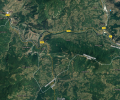The Decision of the War Crimes Trial Chamber unjust for victims and the accused
The Decision reached by the War Crimes Trial Chamber of the Belgrade District Court sentencing former commander of the Suva Reka police station Radojko Repanović and policeman Slađan Čukarić to 20 years in prison, reserve policeman Miroslav Petković to 15 years in prison and former State Security inspector Milorad Nišavić to 13 years in prison while acquitting Radoslav Mitrović, the former commander of the 37th PJP battalion, assistant commander of the Suva Reka police station, and reserve police officer Zoran Petković of the criminal responsibility for the murder of 49 members of the Berisha family and Abdullah Elshani is unjust for both the victims and the accused.
For the families of the victims the trial shed light on the last moments of the lives of their loved ones – for example that the survivors pleaded with Velibor Veljković (witness at the trial) to help them, and that instead of helping them, he informed the accused Miroslav Petković that some people were still alive, after which each and every survivor was individually dealt with. The accused Miroslav Petković was sentenced to 15 years although there were no mitigating circumstances to justify such a low sentence.
The War Crimes Trial Chamber acquitted the accused Radoslav Mitrović, the highest ranking official among the accused, whose direct superior was General Sreten Lukić, Chief-of-Staff of the MUP Headquarters for Kosovo. Lukić was sentenced by the International Criminal Tribunal for the Former Yugoslavia (ICTY) for murder, deportation, and persecution of the Albanian population in Kosovo (for his role in the joint criminal enterprise). The War Crimes Trial Chamber, presided by Justice Vinka-Behara Nikićević failed to take into consideration the judgment of the ICTY against Milan Milutinović and Serbian generals which established that the killing and persecution of the Albanian population were conducted following orders from the MUP Headquarters, which were in the field conducted by “terrain sanitation” units according to the following hierarchy: 37th, 23rd, and other sanitation units of the Special Police Units (PJP). By acquitting of all criminal responsibility the commander of the 37th PJP Battalion, the War Crimes Trial Chamber qualified the murder of the 49 members of the Berisha family as a local incident the responsibility for which is on the hands of the Suva Reka police station and three police officers, none of whom is alive. It is undisputable that the commander of the Suva Reka police officer is responsible for obeying the orders issued by the commander of the 37th PJP Battalion in committing the criminal acts, but the accused Radoslav Mitrović is responsible, both according to the chain of command, and for his direct role in issuing orders to commit criminal acts. The explanation of the War Crimes Trial Chamber that it was not established during the trial that the accused Radoslav Mitrović had directly issued any orders leading to the execution of the criminal act is unconvincing because in the course of the trial it was clearly demonstrated that wherever members of the 37th PJP Battalion were stationed crimes took place.
The decision of the War Crimes Trial Chamber to acquit the commander of the 37th PJP Battalion of criminal responsibility resulted in the acquittal of the assistant of the commander of the Reka police station, because during investigation and during main hearings he stated very decisively that in the morning of March 26, 1999, Radoslav Mitrović, commander of the 37th PJP Battalion in front of the police station building ordered him to gather his policemen and start moving along the Reštane Road, following the members of the 37th PJP Battalion. The War Crimes Trial Chamber did not offer a viable explanation of their decision to acquit the accused Zoran Petković. It remains unclear what led to the War Crimes Trial Chamber justices to believe his statement that he was not at the place of the murder and not to believe the statement of witness Marjan Krasniqi who claimed that he had seen him driving a truck loaded with bodies of the killed Berisha family members.
The War Crimes Trial Chamber was very sympathetic towards former State Security inspector Milorad Nišavić, who combined his personal vendetta into the activity of the Special Police Units and the local police. For him, the war in Kosovo was an opportunity to, among other things, retaliate against the Berisha family for the fact that the OSCE Mission to Kosovo decided to move their local office from the Boss Hotel owned by the Nišavić brothers to a house owned by the Berisha family. The 13 years-in-prison sentence is absolutely inadequate for the criminal act committed by police officer Milorad Nišavić.
Families of the victims, who were often kept for two hours at the Merdare border crossing in anticipation of the special permit issued for them by MUP Serbia to enter the territory of the Republic of Serbia, monitored the trial in constant fear and under pressure by their own people for taking part in a trial in Serbia, but with a strong feeling of personal obligation that they owed it to the victims to make sure the truth is established and told. The families of the victims, Shyrete Berisha, the survivor of the massacre, and other Albanian witnesses from Kosovo testified honestly and helped find out the truth about the events from Suva Reka, which is now public knowledge. In contrast to them, Serbian witnesses from Suva Reka and Prizren portrayed themselves and the entire Serbian community as very bad people.
Nataša Kandić,
Representative of victims’ families in the Suva Reka case trial.
Contact person:
Jelena Grujic
Media coordinator
Humanitarian Law Center
67/II Makenzijeva
Belgrade 11 000
Tel/Fax: + 381 11 3444 313
E-mail: press@hlc-rdc.org
Web site: www.hlc-rdc.org







